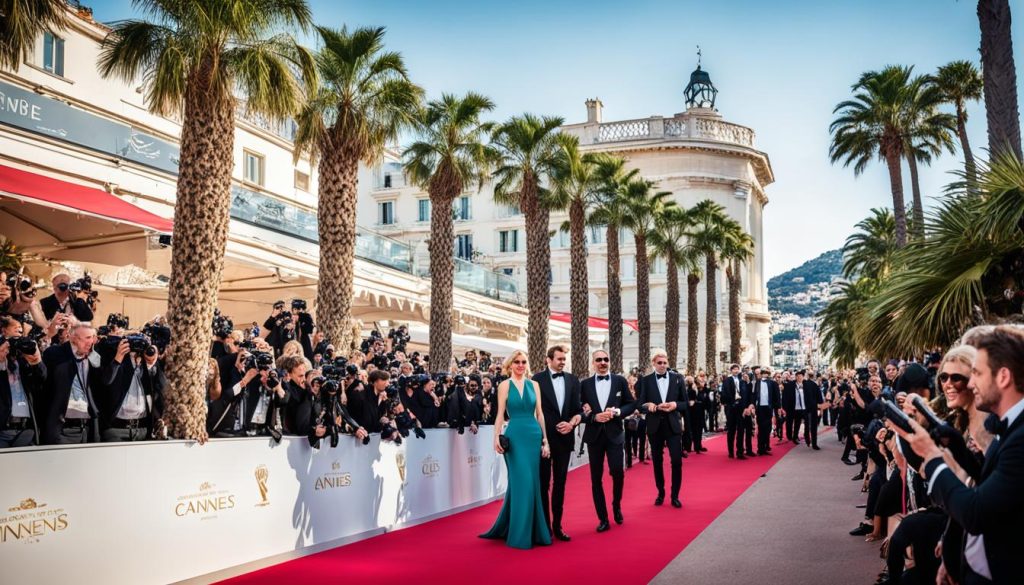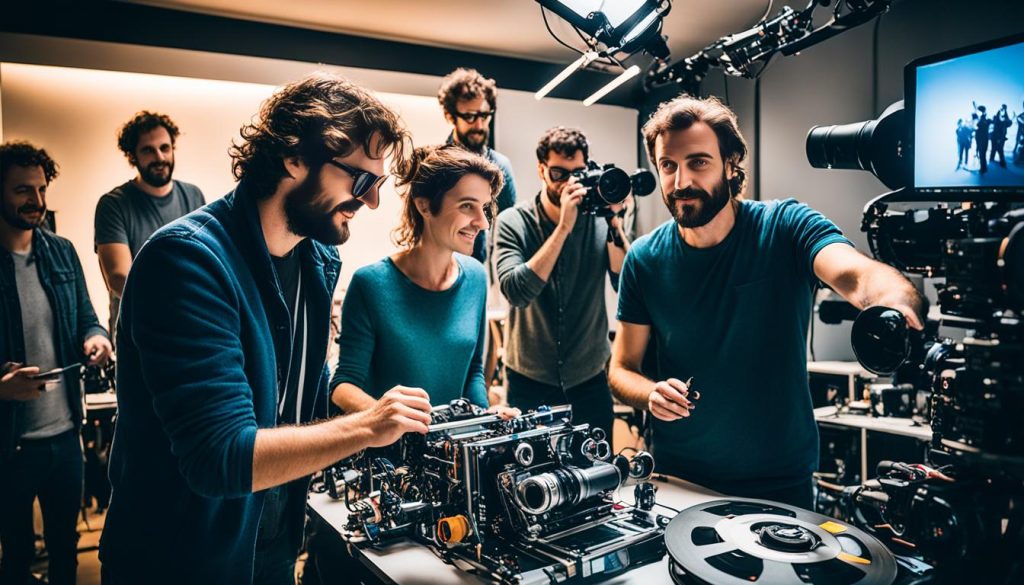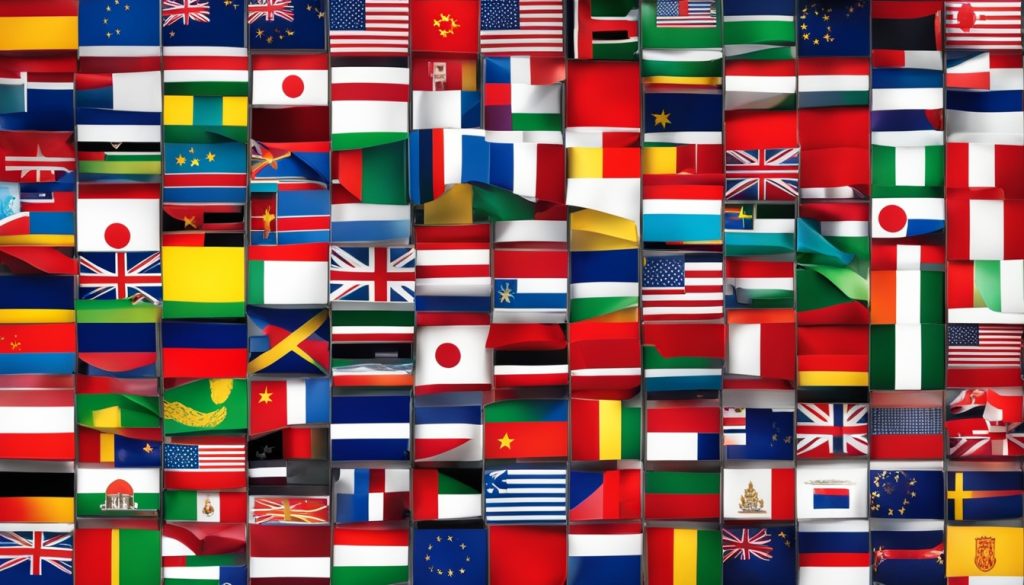In this article, we’ll discover why France stands out in film excellence. We’ll look at its rich cinema history and global contributions. Dive into the creativity and innovation that mark France’s impact on cinema.
Key Takeaways:
- France leads in film excellence, thanks to its deep cinematic history and global impact.
- Its creativity and innovation underline its top spot in the film world.
- The French New) Wave is among movements that changed global filmmaking.
- The Cannes Film Festival showcases French and international films.
- French film schools and institutions help develop future filmmaking talent.
The Birth of French Cinema
To really understand French cinema’s excellence, we must explore its beginnings. The Lumière brothers play a crucial role in this history. In the late 19th century, Louis and Auguste Lumière created the cinematograph. This amazing device could not only record movies but also project them.
The Lumière brothers started the silent film era with their invention. They were among the first to film everyday life, introducing “actualités.” These short films showed real-life moments, changing the way stories were told through cinema.
Their work went beyond technical innovation. Films like “L’Arrivée d’un train en gare de La Ciotat” showed the power of cinema in storytelling and entertainment. A moving train coming towards the audience was enough to astonish them, marking the start of immersive cinema.
The early triumph and artistic base of French cinema owe a lot to the Lumière brothers. Their use of the cinematograph and focus on everyday life helped the film industry thrive.
The Influence of Silent Film Era
The silent film era deeply impacted French cinema’s growth. With no synchronized sound, movies had to use visuals and gestures to show emotions and tell stories.
This time helped French filmmakers excel at visual storytelling since dialogue wasn’t an option. The focus on visuals and cinematography set the stage for French cinema’s distinctive style.
Silent films let French filmmakers express the country’s culture and societal essence. They explored many genres and themes, making French cinema known for its diversity and creativity.
Even as sound films emerged, the silent era’s influence on French cinema remained strong. Visual storytelling and societal exploration are still central to French films today.
Influence of Silent Film Era – Key Characteristics
| Characteristics | Description |
|---|---|
| Visual Storytelling | Silent films relied on visual cues, expressive gestures, and creative cinematography to convey emotions and narratives, emphasizing the power of images. |
| Cultural Expression | French silent films portrayed the country’s unique culture and society, reflecting the values and experiences of the era. |
| Diversity of Genres | French silent films explored various genres, from romantic dramas to experimental films, showcasing the industry’s versatility. |
| Innovation and Experimentation | The silent film era provided a platform for French filmmakers to experiment with cinematic techniques, pushing the boundaries of visual storytelling. |
The French New Wave Movement
The French New New Wave movement changed how stories are told in films. It started in the late 1950s and early 1960s as a push against the old ways of French cinema.
Directors like Jean-Luc Godard and François Truffaut wanted to do things differently. They didn’t like the usual storytelling methods.
They focused on showing personal views and creativity in their movies. These directors were seen as the main forces behind their films.
They tried new story structures and more natural acting. They moved away from the old cinema styles. Their movies felt spontaneous and fresh.
They also used new technology, like lighter cameras. This let them film out in the real world. It gave them the freedom to try new ideas.
They liked to tell stories about real human experiences and social issues. They focused on personal and relatable stories.
Their influence reached far, affecting directors all over the world. Their creative storytelling methods still inspire filmmakers today.
Key Figures of the French New Wave
Here are some important directors of the French New Wave:
| Director | Famous Work |
|---|---|
| Jean-Luc Godard | Breathless (À bout de souffle) |
| François Truffaut | The 400 Blows (Les Quatre Cents Coups) |
| Agnes Varda | Cleo from 5 to 7 (Cléo de 5 à 7) |
| Eric Rohmer | My Night at Maud’s (Ma Nuit chez Maud) |
| Jacques Rivette | Celine and Julie Go Boating (Céline et Julie vont en bateau) |
These directors played a big role in the French New Wave. They helped change cinema worldwide.
Innovative Storytelling Techniques
The French New Wave brought new ways of telling stories:
- Jump Cuts: They used jump cuts to show time passing in a unique way. It made films feel different.
- Breaking the Fourth Wall: Directors would talk to the audience or mix real life with fiction.
- Mise-en-Scène: They carefully chose locations, props, and costumes to tell the story. It helped show what characters were thinking.
- Natural Lighting and Location Shooting: Films were shot in real places with natural light. This made them seem more real.
These methods made the French New Wave stand out. They challenged old movie rules and inspired new filmmakers to be creative.
Cannes Film Festival and French Excellence

The Cannes Film Festival is a top event that highlights French cinema. It attracts people from every corner of the world. Since starting in 1946, it has shown the best in French films.
Filmmakers and actors get to show their work globally at Cannes. A group of film industry leaders decides on the awards. Winning at Cannes means worldwide recognition and new opportunities.
At Cannes, French cinema explores various stories and styles. Filmmakers test new ideas and capture audiences with bold storytelling. The festival’s focus on artistic quality places French cinema at the forefront globally.
The festival is also a hotspot for meeting industry experts. It encourages teamwork between French filmmakers and others globally. This collaboration boosts French cinema’s quality and promotes cultural diversity.
French Films at Cannes
Over time, French films have made a significant impact at Cannes. Titles like The 400 Blows and Amélie showcase French creativity. They have shaped the festival and worldwide cinema.
Directors like Jean-Luc Godard and Agnès Varda are celebrated for their creative storytelling. Their films have influenced many and contribute to cinema’s evolving style.
French actors, including Catherine Deneuve and Marion Cotillard, have also shone at Cannes. Their performances have earned global praise. Each year, Cannes continues to highlight French cinema’s excellence. It has established itself as a key event in the film world.
Year after year, Cannes celebrates French film excellence. It brings together talented filmmakers, actors, and other professionals. Their work leaves a lasting mark on global cinema.
| Year | French Film | Award |
|---|---|---|
| 1959 | The 400 Blows | Best Director (François Truffaut) |
| 2001 | Amélie | Best Production Design |
| 1964 | Band of Outsiders | Silver Bear for Best Director (Jean-Luc Godard) |
| 1993 | Three Colors: Blue | Golden Lion (Krzysztof Kieślowski) |
French Film Institutions and Support
France is known for its robust film institutions. They are crucial in nurturing talent and supporting the industry. The Centre National du Cinéma et de l’Image Animée (CNC) is a key player. It was established in 1946 to serve as the main funding agency for French cinema.
The CNC aims to promote diverse, high-quality films. It provides financial help from script development to production and distribution. Its support benefits both seasoned filmmakers and newcomers, enriching France’s creative environment.
France has other key film institutions too. These groups offer grants, money, and incentives to filmmakers. They encourage fresh ideas, experimentation, and new artistic paths.
These institutions also give filmmakers access to resources and expertise. They offer production facilities, equipment, archives, and professional networks. This support helps filmmakers to bring their visions to life and create impactful movies.
The assistance from these bodies plays a big part in the global success of French cinema. The supported films often win awards and gain acclaim at major festivals worldwide.
Film Institutions in France
| Institution | Role |
|---|---|
| Centre National du Cinéma et de l’Image Animée (CNC) | Main funding body for French cinema, providing financial assistance and support at various stages of film production |
| Agence nationale du cinéma (CineRegio) | Regional funding agency supporting film projects at a local level |
| Europa Cinemas | Network of cinemas promoting European films and encouraging diverse programming |
| La Fémis | Leading film school in France, providing education and training to future filmmakers |
| SACD (Société des auteurs et compositeurs dramatiques) | Organization protecting the rights of authors and playwrights in the audiovisual field |
These film institutions, with government backing, create a nurturing environment for French cinema. They work together to support growth and excellence. Thanks to their joint efforts, French filmmakers can share their stories with the world.
French Film Education
Film education in France plays a crucial role in shaping the film industry’s future. It helps new talents grow. Film schools in France give students both theory and practice in filmmaking.
The Prestigious La Fémis
La Fémis is a top film school in France, known for its high standards. It was started in 1986. The school teaches directing, screenwriting, producing, cinematography, and editing.
Students at La Fémis work closely with industry experts. They go to masterclasses and get real experience by working on projects. This way, students learn skills they need to succeed in film.
La Fémis takes a practical approach to teaching filmmaking. It covers everything from writing scripts to post-production. Students improve their creative and technical skills.
The school also focuses on teamwork. Students collaborate on projects. This builds their creative skills and gets them ready for their careers.
Film Schools Across France
Apart from La Fémis, France has many other great film schools. Each plays a key role in supporting new filmmakers. These schools are where students can share their unique film ideas.
Schools like the Louis Lumière National Higher School and Cannes Film School offer specialised programs. They help students develop their filmmaking skills. They also fuel their love for cinema.
The Impact of Film Education
Film education in France greatly benefits aspiring filmmakers and French cinema. It brings in fresh talent and new ideas. This keeps French films at the cutting edge.
French film schools promote a love for movies. They encourage exploring different stories. This commitment makes French cinema stand out worldwide. It keeps French filmmakers in the international spotlight.
French Filmmakers Making Global Impact

French filmmakers are known for their talent and creativity worldwide. With their compelling stories and unique viewpoints, they have gained awards, recognition, and global fans.
The Masters of French Cinema
When talking about French cinema, we must mention its legendary auteurs. François Truffaut, Jean-Luc Godard, and Jacques Audiard are among those who brought new techniques and thoughtful narratives. They have inspired many and earned international accolades.
A Leading Force in International Film Festivals
French filmmakers shine at film festivals internationally, receiving numerous awards. The Cannes Film Festival, in Cannes, France, is a significant venue for them. It highlights French cinema excellence and enhances their global standing.
Actors Taking the World by Storm
French directors are not the only ones gaining international fame; actors have too. Marion Cotillard, Jean Dujardin, and Isabelle Huppert have charmed the world with their performances. They’ve won awards like the Academy Award, showing French talent in acting is top-notch.
A New Wave of Talent
A new generation of French filmmakers is emerging internationally. Céline Sciamma, Ladj Ly, and Olivier Nakache are notable names. They’re known for their innovative stories and challenging societal norms. Their films are celebrated globally and have earned acclaim at major festivals.
French Cinema: A Global Inspiration
French filmmakers inspire creators all over the world. Their unique styles and dedication to storytelling have had a far-reaching impact. From early pioneers to today’s innovators, French cinema continues to inspire, challenge, and engage audiences everywhere.
| Filmmaker | Film | Awards |
|---|---|---|
| François Truffaut | The 400 Blows | Prix de la mise en scène – Cannes Film Festival |
| Jean-Luc Godard | Breathless | Silver Bear for Best Director – Berlin International Film Festival |
| Jacques Audiard | A Prophet | Grand Prix – Cannes Film Festival |
| Marion Cotillard | La Vie en Rose | Academy Award for Best Actress |
| Jean Dujardin | The Artist | Academy Award for Best Actor |
| Isabelle Huppert | Elle | Golden Globe Award for Best Actress |
Diversity and Representation in French Cinema
French cinema stands out for its embrace of diverse themes and perspectives. It champions diversity and representation. This approach has allowed filmmakers to tackle social issues head-on. It contributes towards a more inclusive cinematic world.
French Cinema’s Exploration of Social Issues
French cinema boldly addresses complex social issues. It uses powerful stories to highlight matters like racism, gender inequality, and LGBTQ+ rights. By exploring these topics, it encourages audiences to think deeply about the society we live in.
Challenging Norms and Stereotypes
It’s also at the forefront of challenging societal norms and stereotypes. French filmmakers push boundaries to offer new perspectives. This helps audiences see beyond traditional portrayals, making cinema more inclusive.
A Platform for Underrepresented Voices
French cinema gives a voice to the underrepresented. It shines a light on the diverse human experience. Celebrating different voices fosters empathy and understanding among viewers.
The Impact of French Cinema
French cinema’s impact reaches far beyond its movies. It fosters collaborations with diverse artists worldwide. This exchange enhances global cinema and promotes cultural understanding.
Continuing the Journey Towards Inclusivity
Although much progress has been made, there’s still more to do. French cinema keeps advocating for inclusivity. It aims to support diverse voices and create a fairer industry for everyone.
Technological Advancements and French Innovation
France has made great leaps in the global film industry, more than just in artistic skill. It’s known for its tech innovations, shaping cinema experiences. French innovation changes how we see films.
French filmmakers use the latest tech in their films, creating amazing visual effects. Their hard work brings magical moments to the screen. They take viewers to incredible new worlds.
Revolutionizing Animation:
In animation, France leads with creativity and skill. French artists bring new ideas and techniques, evolving the art. Their work ranges from traditional to the latest computer imagery, showing dedication to their craft.
Advancing Visual Effects:
French creators have also pushed forward in visual effects. They create enchanting worlds and lifelike creatures. Using computers and practical effects, they tell stories that wow us.
But French innovation isn’t just about visuals. It includes better production methods and teamwork in filmmaking. This makes film creation smoother and better.
To sum up, France’s film industry is a powerhouse of tech and creativity. Its focus on visual and animation tech makes it a global cinema leader. French filmmakers’ dedication to excellence brings their stunning visions to life, delighting audiences everywhere.
International Collaborations and Co-productions

France plays a big role in the world’s film scene, working with others across borders. By teaming up with international talent, French filmmakers share cultures and bring many voices to the cinema. This makes France an important player in movies worldwide.
France values working with filmmakers from other countries. It helps bring different stories to everyone. By doing this, France makes sure its films touch people everywhere. Sharing ideas and skills helps push creativity to new heights.
Co-productions are key for international teamwork. France joins hands with countries like the USA, the UK, China, and more. This way, they make high-quality films for a global audience by sharing costs and creative ideas.
Benefits of International Collaborations and Co-productions
Working together on films is not just about making great art. It also helps make money for France and its film partners. By investing together and sharing films more widely, these movies can make a bigger splash.
These film partnerships help France build friendships with other countries too. By making movies with people from different places, France shares its culture. This builds strong international connections and shows the world what French cinema can do.
Examples of International Collaborations
France has had many successful international film projects. For instance, French director Jean-Pierre Jeunet worked with Mexican cinematographer Emmanuel Lubezki. They made “The Fabulous Life of Amélie Poulain” (2001), a film loved all over the world.
| Film Title | Country of Co-production |
|---|---|
| Blue Is the Warmest Colour (2013) | Tunisia |
| The Intouchables (2011) | Germany |
| Caché (2005) | Austria |
| The Artist (2011) | Belgium |
| Elle (2016) | Germany |
These films show how France is committed to working with others around the globe. They highlight the country’s dedication to making connections through cinema.
French Film Festivals Beyond Cannes
Cannes is top for French film festivals, but other events also shine. Regional showcases celebrate new talent and varied stories. These festivals offer filmmakers great chances to present their work and meet audiences.
The Rendez-vous with French Cinema festival in Paris is one such event. The Film Society of Lincoln Center and UniFrance organize it. They pick the best new French films, showing how diverse and creative French cinema is. It’s a way for new talents to get noticed worldwide.
The Locarno Film Festival in Switzerland also stands out. It has a “Carte Blanche” section just for French cinema. This part spotlights upcoming French filmmakers, giving us a peek at the future of French films.
Down south, the Marseille International Film Festival highlights both local and global cinema. It’s not just about French films; it shows movies from all over, helping different cultures connect. This festival is great for finding new talent.
Then there’s the La Rochelle International Film Festival in Western France. It’s known for classics and retrospectives. It features French and international films. While it mainly showcases veterans, newer filmmakers can still get exposure and learn a lot.
Apart from Cannes, these French film festivals offer unique experiences. They welcome new filmmakers and promote creativity in French cinema. Each festival is a chance to explore fresh talent and foster the growth of the film industry.
Notable French Film Festivals:
- Rendez-vous with French Cinema
- Locarno Film Festival
- Marseille International Film Festival
- La Rochelle International Film Festival
Future Prospects for French Film Excellence
French cinema is entering an exciting phase. It has a glowing past and a passion for pushing creative limits. The outlook for French films looks bright, thanks to this drive for innovation.
French cinema excels by staying in tune with what viewers want. Filmmakers grasp global trends well, blending them into their stories. This makes French films popular worldwide and keeps them relevant.
Technology is also reshaping what’s possible in movies. French cinema uses new tech to tell stories in fresh ways. Effects and immersive tools allow for more creativity, offering audiences unique experiences.
The Role of France in Shaping the Future of Cinema
France’s role in the world of film is huge and will keep growing. It’s home to top film schools and the Cannes Film Festival. These platforms help new talents shine and encourage global collaboration.Support from French film bodies helps hopeful filmmakers realize their dreams. France’s cultural wealth and beautiful scenery make it a filmmaker’s paradise. This draws artists from all over the globe.
Commitment to showing different lives and views also shapes French cinema. There’s a real effort to include diverse stories and voices. This enriches films and ensures more stories reach the screen.
In sum, the future shines for French cinema. Its willingness to adapt, use new tech, and work together internationally sets it apart. France leads the way in cinema, inspiring the global film scene with its creativity and culture.
Conclusion
France stands out in the world of cinema because of its leadership and history. Its dedication to film is shown through its rich cinematic past and support of new talent. France has always set new highs in the art of telling stories on screen.
From the early days to the innovative French New Wave, France leads in creativity. Its film organisations and support systems help upcoming filmmakers. They give them the tools needed to achieve great things.
French filmmakers have made their mark both at home and internationally. Their works are recognised worldwide. With global partnerships, France makes films that are diverse and speak to many cultures.
Looking ahead, France’s cinema is set to keep its leading position. Its focus on new technology and adapting to changes ensures its lasting impact in film worldwide.
















